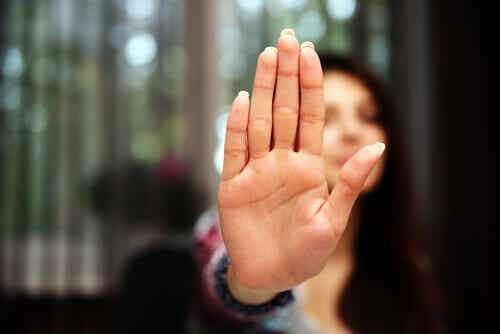One of the most popular psychology tests for assessing self-esteem is the famous Rosenberg scale. It is a ten-question test that helps us evaluate this dimension so fundamental to our psychological well-being.

Written and verified by the psychologist GetPersonalGrowth.
Last update: 24 March, 2022
Rosenberg's self-esteem scale is one of the best known and most used. Even if we are dealing with a psychometric tool born over fifty years ago, it still boasts a certain simplicity today (it is composed of only 10 evaluation statements). Its reliability and validity are particularly interesting.
When we talk about self-esteem, everyone knows how to define it, more or less. It is about the idea we have of ourselves and how we value ourselves. At this point, it is important to say that this dimension has different shades, more marked brushstrokes that outline a psychological canvas rich in single tones, shapes and perspectives.
Self-esteem is the set of thoughts we formulate every day towards us, but also the perceptions of how others see us. Furthermore, we cannot fail to take into account the weight of childhood, training, interaction with parents, friends, partners ... This dimension is a totum revolutum that incorporates concepts such as identity, self-awareness, self-efficacy, etc.
To deepen this concept, it is interesting to consult the numerous works of Morris Rosenberg, professor of sociology at the University of Maryland and pioneer of studies in this sector. The publication of one of his books, Society and the adolescence self-image, in 1965, was the occasion to present a preview of his self-esteem scale. This technique is still one of the most used psychometric tools today. Let's see why.
No one can feel comfortable without self-approval.
-Mark Twain-
Rosenberg's Self-Esteem Scale
Self-esteem is a subjective psychological construct. We know that its ingredients are shaped through every experience and evaluation we make of it, including what we say about ourselves, how we treat ourselves, how much we value ourselves and how we value ourselves in almost any aspect of our life.
It is important to underline one aspect: self-esteem is an emotional dimension. We cannot forget that this competence, at some point, can fluctuate, especially starting from the way we interpret and deal with certain events in the course of our life. This means that no one comes into the world with strong self-esteem and preserves it until the end of their days.
Self-esteem is like a muscle: if we don't train it, it sometimes gets weaker. By training it every day, everything flows, everything weighs a little less and we feel strong enough to face anything. A good starting point for knowing what state that "psychological muscle" is in is by using the Rosenberg self-esteem scale, the most reliable tool to date.
What is the story of this test?
Morris Rosenberg developed this scale based on data obtained from 5.024 teenage students born in the United States. His idea was to understand how the social context of origin relates to the concept of self-esteem. He knew that aspects such as education, the environment and the family can contribute to or affect this psychological construct.
His idea was to develop a self-esteem test to assess the psychological state of adolescents in his country. This study was developed in 1960, arousing immediate interest from the scientific community. Above all because the scale demonstrated high reliability and because it continues to be a valid tool over the years, and among the different populations of the world.
Application of the Rosenberg self-esteem scale
One of the characteristics of this psychological test that most deserves attention is the simplicity of application. The test consists of 10 statements, with four likert-style response options each ranging from absolutely agree to absolutely disagree. If we ask ourselves now how it is possible to affirm the validity of this tool, consisting of only ten questions, it is interesting to highlight a detail.
In 2001, Dr. Richar W. Robbins stated that to assess self-esteem, in reality, it would be enough to ask a single question, one like "do I have good self-esteem?". He developed the Single-item Self-Esteem Scale (SISE), demonstrating that this single-statement rating scale is as effective as the Rosenberg scale.
What does the Rosenberg scale consist of and how is it evaluated?
The statements that make up the Rosenberg self-esteem scale are as follows:
- I feel I am a person worthy of appreciation, at least as much as others are.
- I am convinced that I have good qualities.
- I can do things as well as most people do.
- I have a positive attitude towards myself.
- In general, I am satisfied with myself.
- I feel like I don't have much to be proud of.
- In general, I tend to think I'm a failure.
- I would like to have more respect for myself.
- Sometimes I feel really useless.
- Sometimes I think I'm not a good person.
Each question must be assessed on the basis of the following types of answers:
- A. Strongly agree
- B. All right
- C. Disagree
- D. Strongly disagree
Interpretation of the psychology test of self-esteem
When the time has come to evaluate each answer, we rely on the following guidelines:
- Questions from 1 to 5, the answers from A to D are calculated according to a score ranging from 4 to 1.
- Questions 6 to 10, answers A to D give a score from 1 to 4.
With a final score ranging from 30 to 40 points we will have a good level of self-esteem. If the final score oscillates between 26 and 29 points, our self-esteem level will be medium, so it is advisable to work on it. Finally, if we get a score of 25 or less, our self-esteem will be low.
In conclusion, the Rosenberg self-esteem scale is a useful and simple tool, very practical in order to evaluate both patients in a clinical setting and the general population. This psychological resource is worth keeping in mind.


























